Legal and Ethical Compliance in Pharmacy: Manager's Responsibilities
VerifiedAdded on 2023/04/03
|10
|1804
|336
Report
AI Summary
This report provides a detailed overview of the legal and ethical responsibilities of a pharmacy manager, focusing on compliance with regulations such as the Health Practitioner Regulation National Law Act, Privacy Act, and Controlled Substance Act. It discusses ethical guidelines from the Pharmaceutical Society of Australia and the Society of Hospital Pharmacists of Australia, emphasizing respect, teamwork, and risk management. The report also addresses the risks and penalties of non-compliance, including criminal charges and reputational damage, and suggests three leadership approaches: giving credit, avoiding bossiness, and supporting colleagues. Furthermore, it outlines strategies for compliance monitoring, including self-assessments and data tracking, and proposes policies for managing ethics, training employees, and adopting a risk-based approach. The report concludes with practical steps for dealing with employee breaches of compliance, maintaining personal knowledge of requirements, and effectively communicating updates to staff, ensuring a legally and ethically sound pharmacy operation. Desklib offers a wealth of similar solved assignments and past papers to aid students in their studies.
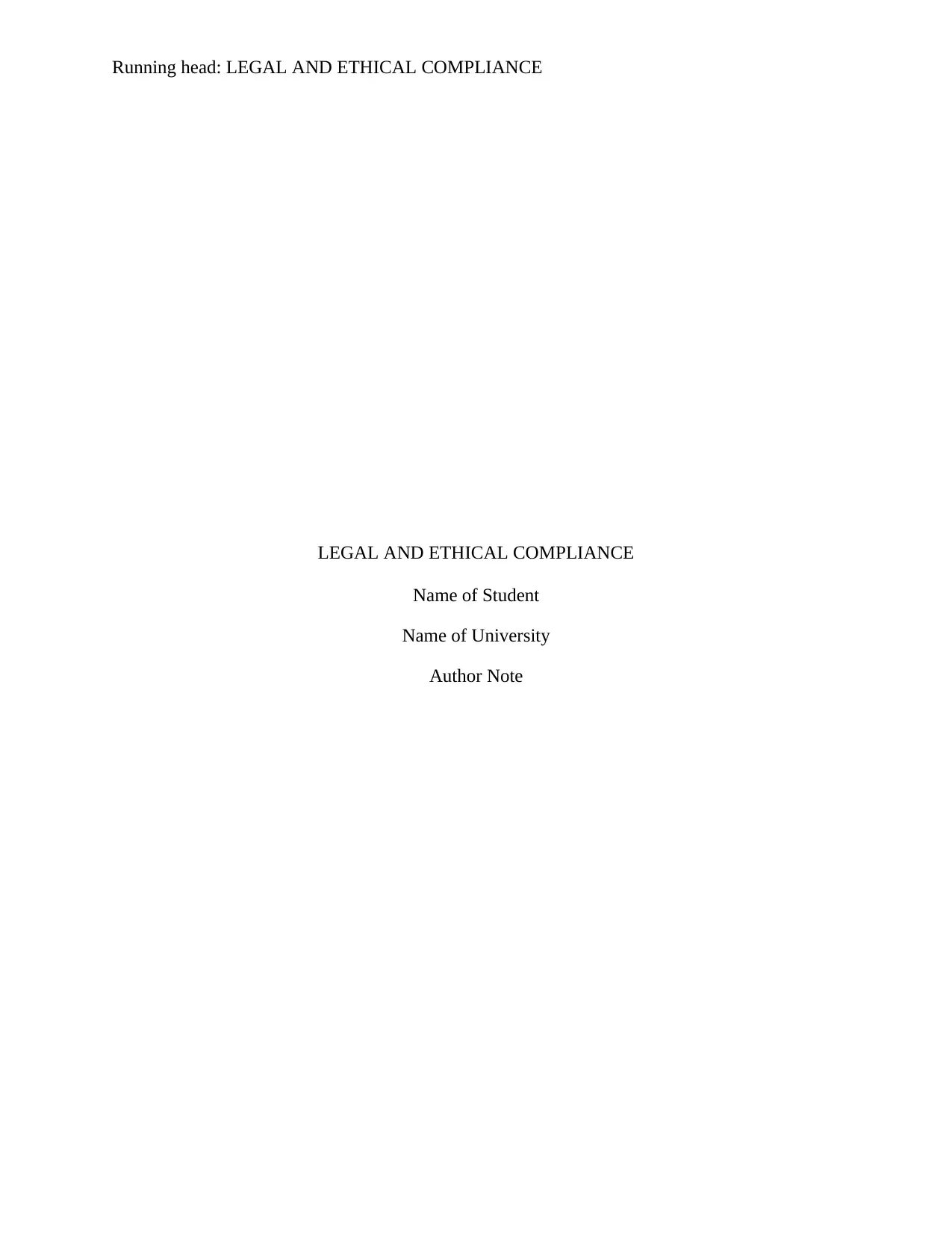
Running head: LEGAL AND ETHICAL COMPLIANCE
LEGAL AND ETHICAL COMPLIANCE
Name of Student
Name of University
Author Note
LEGAL AND ETHICAL COMPLIANCE
Name of Student
Name of University
Author Note
Paraphrase This Document
Need a fresh take? Get an instant paraphrase of this document with our AI Paraphraser
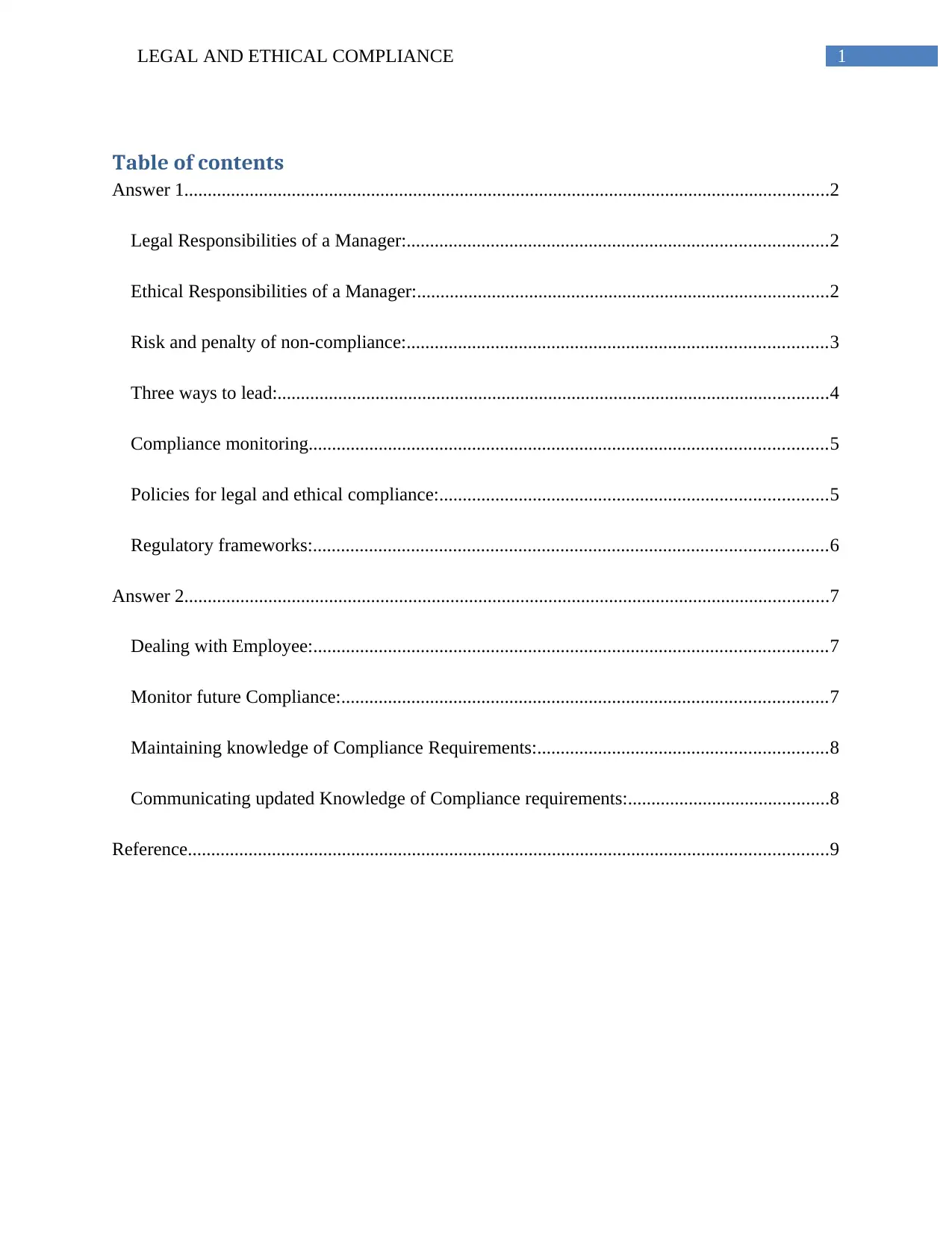
1LEGAL AND ETHICAL COMPLIANCE
Table of contents
Answer 1..........................................................................................................................................2
Legal Responsibilities of a Manager:..........................................................................................2
Ethical Responsibilities of a Manager:........................................................................................2
Risk and penalty of non-compliance:..........................................................................................3
Three ways to lead:......................................................................................................................4
Compliance monitoring...............................................................................................................5
Policies for legal and ethical compliance:...................................................................................5
Regulatory frameworks:..............................................................................................................6
Answer 2..........................................................................................................................................7
Dealing with Employee:..............................................................................................................7
Monitor future Compliance:........................................................................................................7
Maintaining knowledge of Compliance Requirements:..............................................................8
Communicating updated Knowledge of Compliance requirements:...........................................8
Reference.........................................................................................................................................9
Table of contents
Answer 1..........................................................................................................................................2
Legal Responsibilities of a Manager:..........................................................................................2
Ethical Responsibilities of a Manager:........................................................................................2
Risk and penalty of non-compliance:..........................................................................................3
Three ways to lead:......................................................................................................................4
Compliance monitoring...............................................................................................................5
Policies for legal and ethical compliance:...................................................................................5
Regulatory frameworks:..............................................................................................................6
Answer 2..........................................................................................................................................7
Dealing with Employee:..............................................................................................................7
Monitor future Compliance:........................................................................................................7
Maintaining knowledge of Compliance Requirements:..............................................................8
Communicating updated Knowledge of Compliance requirements:...........................................8
Reference.........................................................................................................................................9
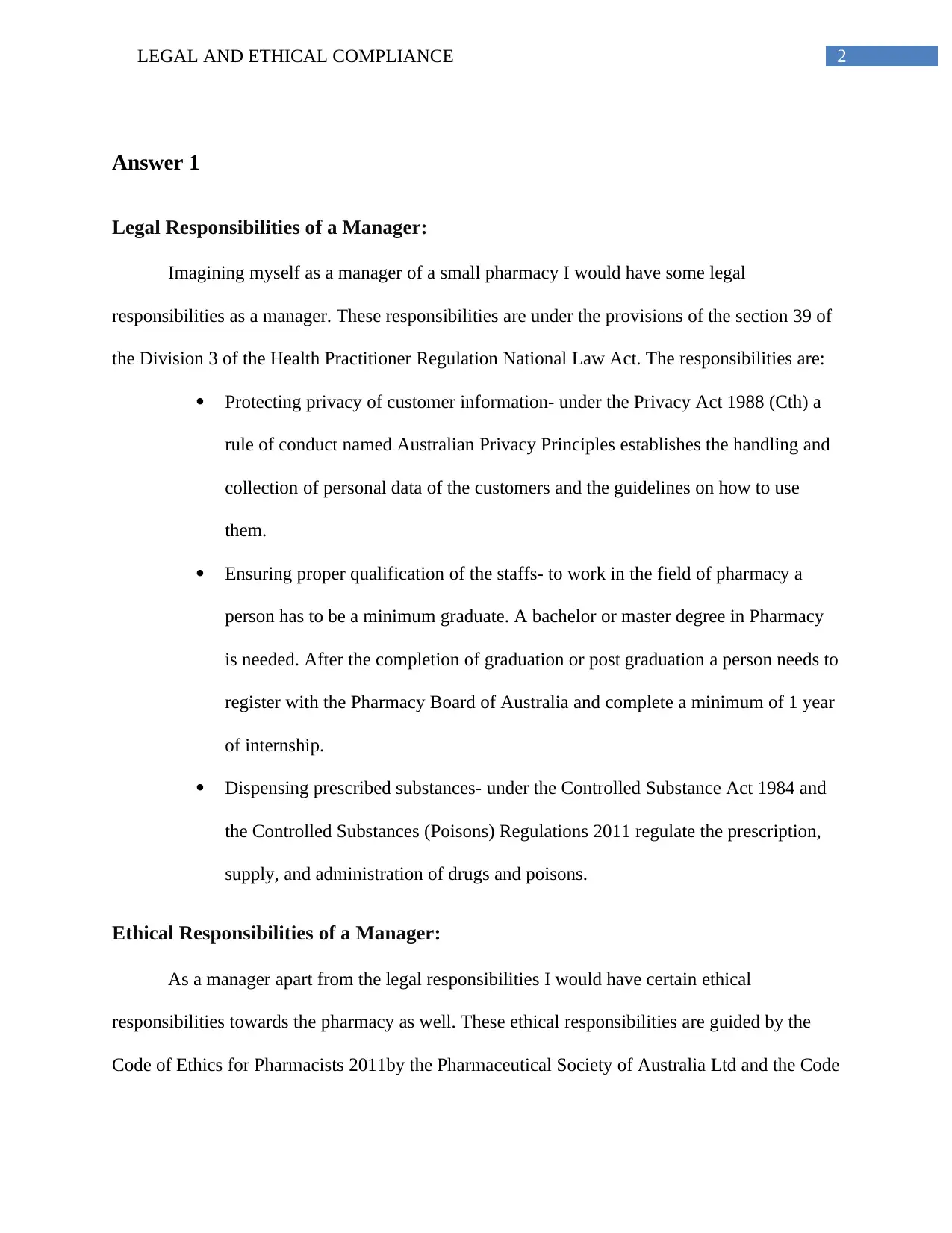
2LEGAL AND ETHICAL COMPLIANCE
Answer 1
Legal Responsibilities of a Manager:
Imagining myself as a manager of a small pharmacy I would have some legal
responsibilities as a manager. These responsibilities are under the provisions of the section 39 of
the Division 3 of the Health Practitioner Regulation National Law Act. The responsibilities are:
Protecting privacy of customer information- under the Privacy Act 1988 (Cth) a
rule of conduct named Australian Privacy Principles establishes the handling and
collection of personal data of the customers and the guidelines on how to use
them.
Ensuring proper qualification of the staffs- to work in the field of pharmacy a
person has to be a minimum graduate. A bachelor or master degree in Pharmacy
is needed. After the completion of graduation or post graduation a person needs to
register with the Pharmacy Board of Australia and complete a minimum of 1 year
of internship.
Dispensing prescribed substances- under the Controlled Substance Act 1984 and
the Controlled Substances (Poisons) Regulations 2011 regulate the prescription,
supply, and administration of drugs and poisons.
Ethical Responsibilities of a Manager:
As a manager apart from the legal responsibilities I would have certain ethical
responsibilities towards the pharmacy as well. These ethical responsibilities are guided by the
Code of Ethics for Pharmacists 2011by the Pharmaceutical Society of Australia Ltd and the Code
Answer 1
Legal Responsibilities of a Manager:
Imagining myself as a manager of a small pharmacy I would have some legal
responsibilities as a manager. These responsibilities are under the provisions of the section 39 of
the Division 3 of the Health Practitioner Regulation National Law Act. The responsibilities are:
Protecting privacy of customer information- under the Privacy Act 1988 (Cth) a
rule of conduct named Australian Privacy Principles establishes the handling and
collection of personal data of the customers and the guidelines on how to use
them.
Ensuring proper qualification of the staffs- to work in the field of pharmacy a
person has to be a minimum graduate. A bachelor or master degree in Pharmacy
is needed. After the completion of graduation or post graduation a person needs to
register with the Pharmacy Board of Australia and complete a minimum of 1 year
of internship.
Dispensing prescribed substances- under the Controlled Substance Act 1984 and
the Controlled Substances (Poisons) Regulations 2011 regulate the prescription,
supply, and administration of drugs and poisons.
Ethical Responsibilities of a Manager:
As a manager apart from the legal responsibilities I would have certain ethical
responsibilities towards the pharmacy as well. These ethical responsibilities are guided by the
Code of Ethics for Pharmacists 2011by the Pharmaceutical Society of Australia Ltd and the Code
⊘ This is a preview!⊘
Do you want full access?
Subscribe today to unlock all pages.

Trusted by 1+ million students worldwide
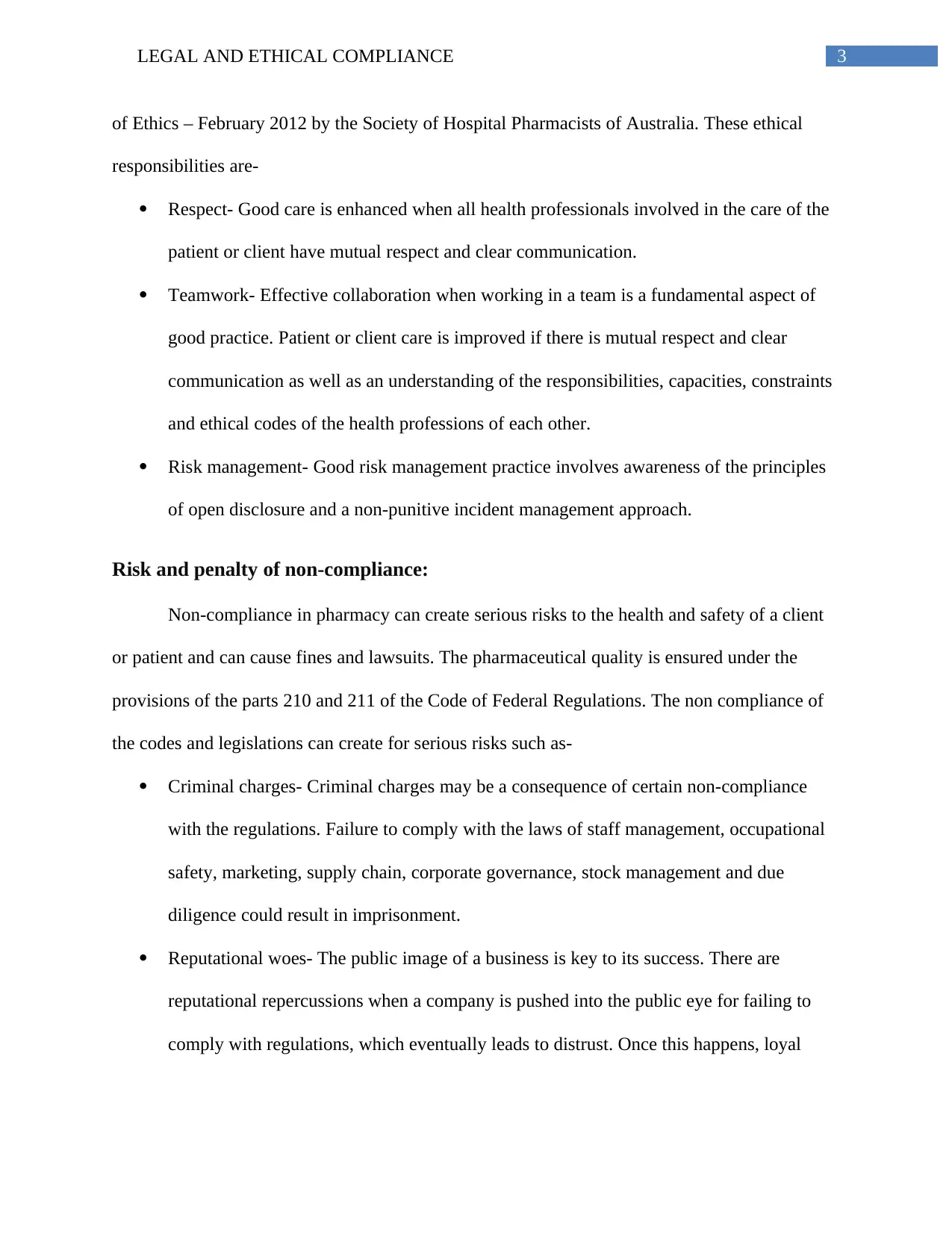
3LEGAL AND ETHICAL COMPLIANCE
of Ethics – February 2012 by the Society of Hospital Pharmacists of Australia. These ethical
responsibilities are-
Respect- Good care is enhanced when all health professionals involved in the care of the
patient or client have mutual respect and clear communication.
Teamwork- Effective collaboration when working in a team is a fundamental aspect of
good practice. Patient or client care is improved if there is mutual respect and clear
communication as well as an understanding of the responsibilities, capacities, constraints
and ethical codes of the health professions of each other.
Risk management- Good risk management practice involves awareness of the principles
of open disclosure and a non-punitive incident management approach.
Risk and penalty of non-compliance:
Non-compliance in pharmacy can create serious risks to the health and safety of a client
or patient and can cause fines and lawsuits. The pharmaceutical quality is ensured under the
provisions of the parts 210 and 211 of the Code of Federal Regulations. The non compliance of
the codes and legislations can create for serious risks such as-
Criminal charges- Criminal charges may be a consequence of certain non-compliance
with the regulations. Failure to comply with the laws of staff management, occupational
safety, marketing, supply chain, corporate governance, stock management and due
diligence could result in imprisonment.
Reputational woes- The public image of a business is key to its success. There are
reputational repercussions when a company is pushed into the public eye for failing to
comply with regulations, which eventually leads to distrust. Once this happens, loyal
of Ethics – February 2012 by the Society of Hospital Pharmacists of Australia. These ethical
responsibilities are-
Respect- Good care is enhanced when all health professionals involved in the care of the
patient or client have mutual respect and clear communication.
Teamwork- Effective collaboration when working in a team is a fundamental aspect of
good practice. Patient or client care is improved if there is mutual respect and clear
communication as well as an understanding of the responsibilities, capacities, constraints
and ethical codes of the health professions of each other.
Risk management- Good risk management practice involves awareness of the principles
of open disclosure and a non-punitive incident management approach.
Risk and penalty of non-compliance:
Non-compliance in pharmacy can create serious risks to the health and safety of a client
or patient and can cause fines and lawsuits. The pharmaceutical quality is ensured under the
provisions of the parts 210 and 211 of the Code of Federal Regulations. The non compliance of
the codes and legislations can create for serious risks such as-
Criminal charges- Criminal charges may be a consequence of certain non-compliance
with the regulations. Failure to comply with the laws of staff management, occupational
safety, marketing, supply chain, corporate governance, stock management and due
diligence could result in imprisonment.
Reputational woes- The public image of a business is key to its success. There are
reputational repercussions when a company is pushed into the public eye for failing to
comply with regulations, which eventually leads to distrust. Once this happens, loyal
Paraphrase This Document
Need a fresh take? Get an instant paraphrase of this document with our AI Paraphraser
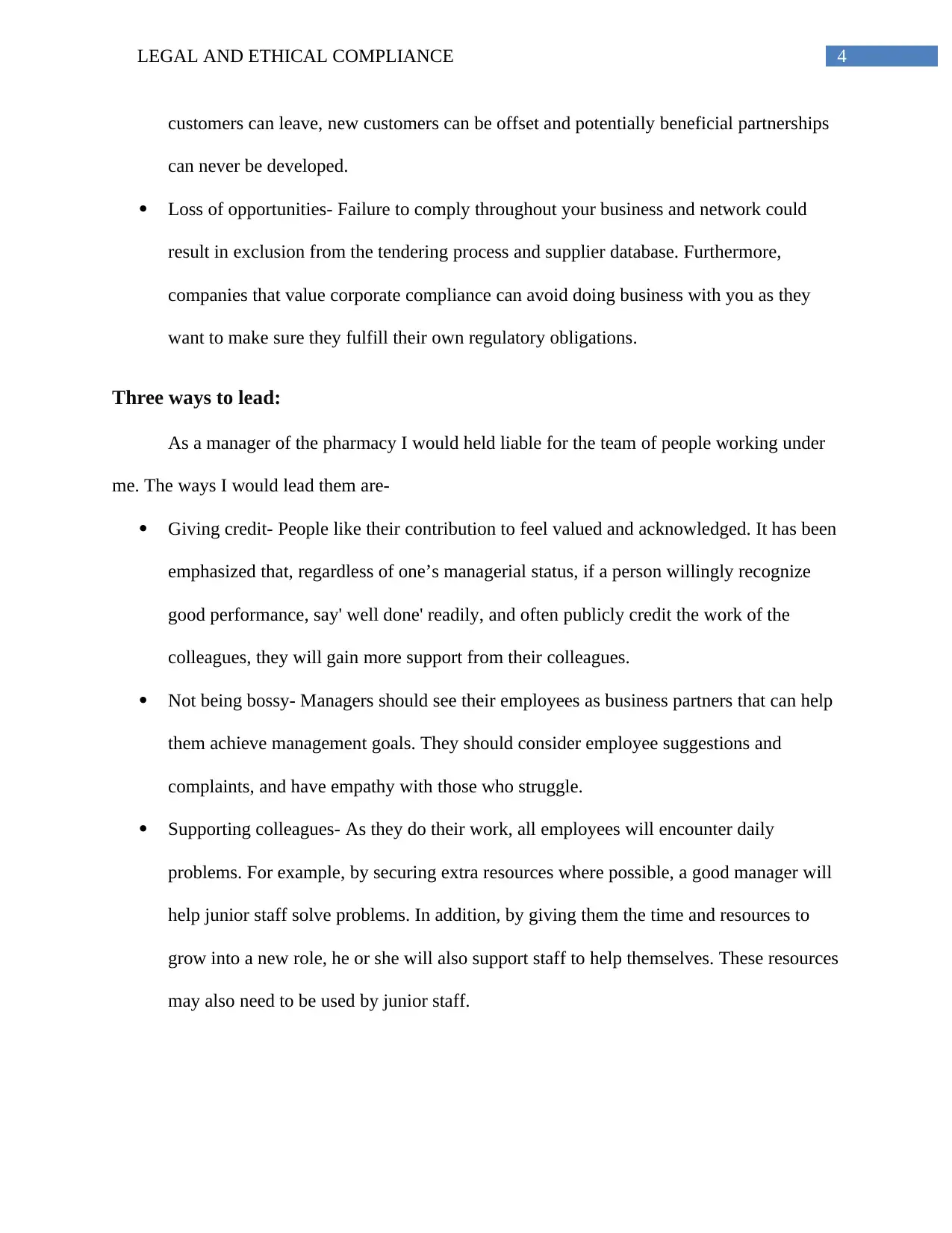
4LEGAL AND ETHICAL COMPLIANCE
customers can leave, new customers can be offset and potentially beneficial partnerships
can never be developed.
Loss of opportunities- Failure to comply throughout your business and network could
result in exclusion from the tendering process and supplier database. Furthermore,
companies that value corporate compliance can avoid doing business with you as they
want to make sure they fulfill their own regulatory obligations.
Three ways to lead:
As a manager of the pharmacy I would held liable for the team of people working under
me. The ways I would lead them are-
Giving credit- People like their contribution to feel valued and acknowledged. It has been
emphasized that, regardless of one’s managerial status, if a person willingly recognize
good performance, say' well done' readily, and often publicly credit the work of the
colleagues, they will gain more support from their colleagues.
Not being bossy- Managers should see their employees as business partners that can help
them achieve management goals. They should consider employee suggestions and
complaints, and have empathy with those who struggle.
Supporting colleagues- As they do their work, all employees will encounter daily
problems. For example, by securing extra resources where possible, a good manager will
help junior staff solve problems. In addition, by giving them the time and resources to
grow into a new role, he or she will also support staff to help themselves. These resources
may also need to be used by junior staff.
customers can leave, new customers can be offset and potentially beneficial partnerships
can never be developed.
Loss of opportunities- Failure to comply throughout your business and network could
result in exclusion from the tendering process and supplier database. Furthermore,
companies that value corporate compliance can avoid doing business with you as they
want to make sure they fulfill their own regulatory obligations.
Three ways to lead:
As a manager of the pharmacy I would held liable for the team of people working under
me. The ways I would lead them are-
Giving credit- People like their contribution to feel valued and acknowledged. It has been
emphasized that, regardless of one’s managerial status, if a person willingly recognize
good performance, say' well done' readily, and often publicly credit the work of the
colleagues, they will gain more support from their colleagues.
Not being bossy- Managers should see their employees as business partners that can help
them achieve management goals. They should consider employee suggestions and
complaints, and have empathy with those who struggle.
Supporting colleagues- As they do their work, all employees will encounter daily
problems. For example, by securing extra resources where possible, a good manager will
help junior staff solve problems. In addition, by giving them the time and resources to
grow into a new role, he or she will also support staff to help themselves. These resources
may also need to be used by junior staff.
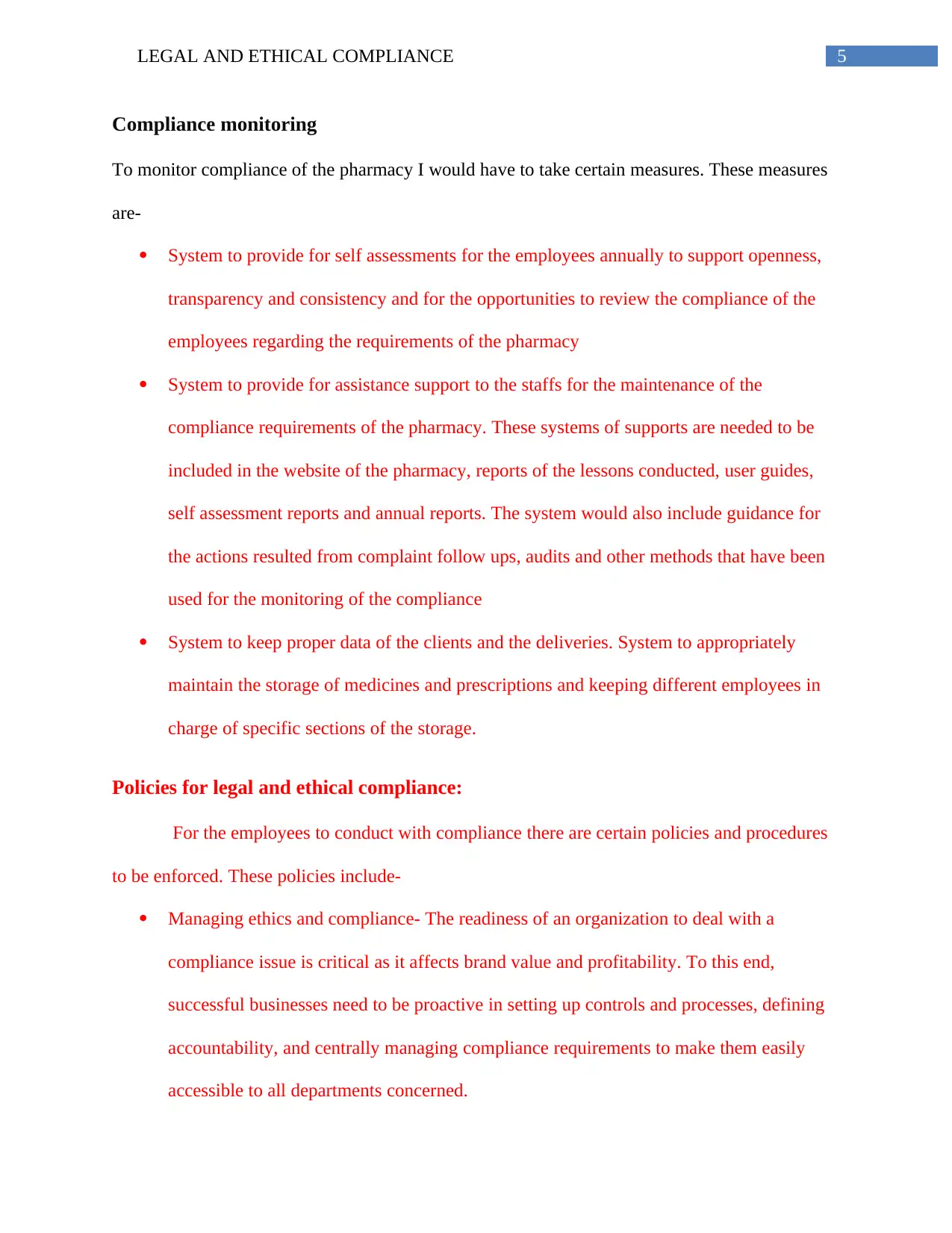
5LEGAL AND ETHICAL COMPLIANCE
Compliance monitoring
To monitor compliance of the pharmacy I would have to take certain measures. These measures
are-
System to provide for self assessments for the employees annually to support openness,
transparency and consistency and for the opportunities to review the compliance of the
employees regarding the requirements of the pharmacy
System to provide for assistance support to the staffs for the maintenance of the
compliance requirements of the pharmacy. These systems of supports are needed to be
included in the website of the pharmacy, reports of the lessons conducted, user guides,
self assessment reports and annual reports. The system would also include guidance for
the actions resulted from complaint follow ups, audits and other methods that have been
used for the monitoring of the compliance
System to keep proper data of the clients and the deliveries. System to appropriately
maintain the storage of medicines and prescriptions and keeping different employees in
charge of specific sections of the storage.
Policies for legal and ethical compliance:
For the employees to conduct with compliance there are certain policies and procedures
to be enforced. These policies include-
Managing ethics and compliance- The readiness of an organization to deal with a
compliance issue is critical as it affects brand value and profitability. To this end,
successful businesses need to be proactive in setting up controls and processes, defining
accountability, and centrally managing compliance requirements to make them easily
accessible to all departments concerned.
Compliance monitoring
To monitor compliance of the pharmacy I would have to take certain measures. These measures
are-
System to provide for self assessments for the employees annually to support openness,
transparency and consistency and for the opportunities to review the compliance of the
employees regarding the requirements of the pharmacy
System to provide for assistance support to the staffs for the maintenance of the
compliance requirements of the pharmacy. These systems of supports are needed to be
included in the website of the pharmacy, reports of the lessons conducted, user guides,
self assessment reports and annual reports. The system would also include guidance for
the actions resulted from complaint follow ups, audits and other methods that have been
used for the monitoring of the compliance
System to keep proper data of the clients and the deliveries. System to appropriately
maintain the storage of medicines and prescriptions and keeping different employees in
charge of specific sections of the storage.
Policies for legal and ethical compliance:
For the employees to conduct with compliance there are certain policies and procedures
to be enforced. These policies include-
Managing ethics and compliance- The readiness of an organization to deal with a
compliance issue is critical as it affects brand value and profitability. To this end,
successful businesses need to be proactive in setting up controls and processes, defining
accountability, and centrally managing compliance requirements to make them easily
accessible to all departments concerned.
⊘ This is a preview!⊘
Do you want full access?
Subscribe today to unlock all pages.

Trusted by 1+ million students worldwide
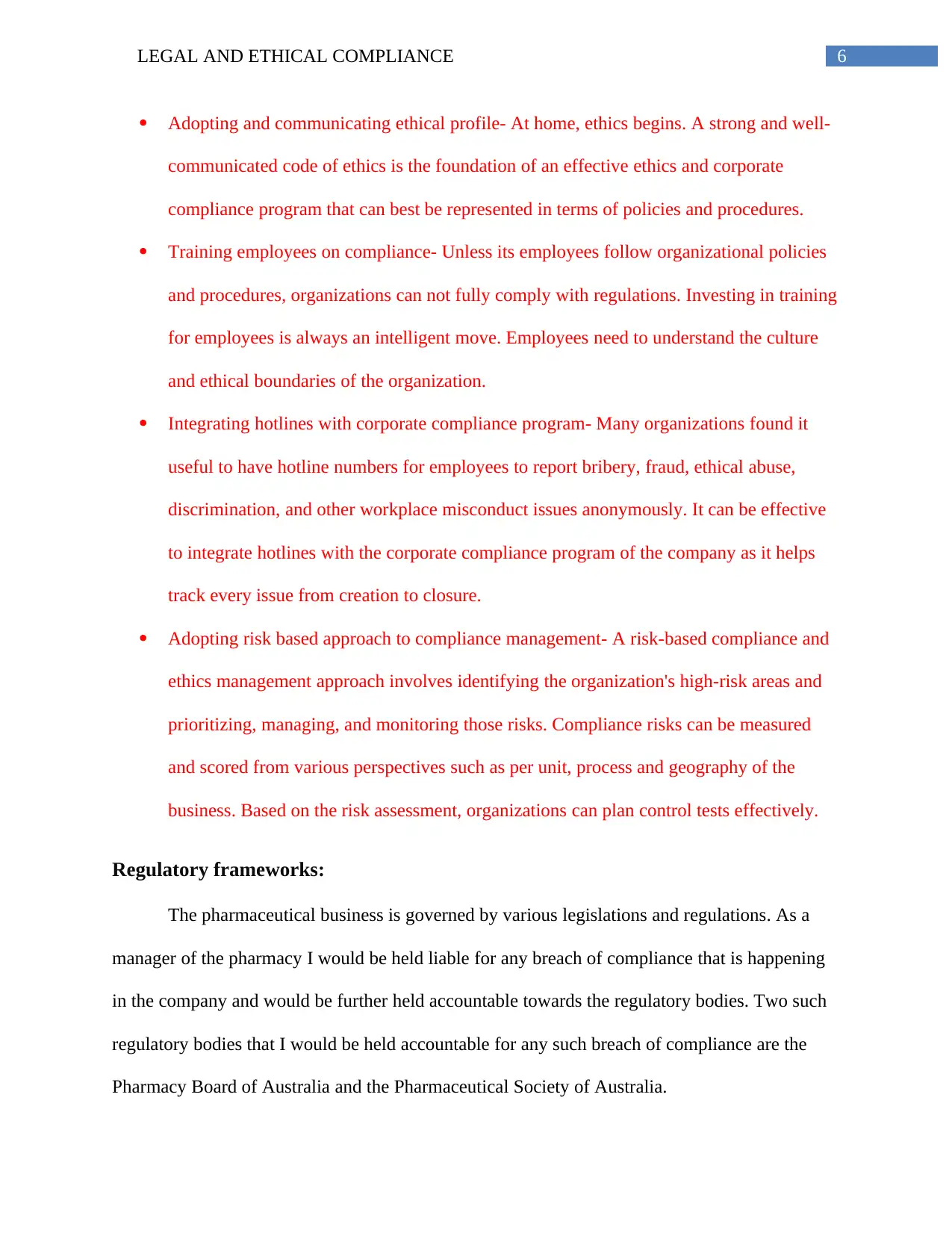
6LEGAL AND ETHICAL COMPLIANCE
Adopting and communicating ethical profile- At home, ethics begins. A strong and well-
communicated code of ethics is the foundation of an effective ethics and corporate
compliance program that can best be represented in terms of policies and procedures.
Training employees on compliance- Unless its employees follow organizational policies
and procedures, organizations can not fully comply with regulations. Investing in training
for employees is always an intelligent move. Employees need to understand the culture
and ethical boundaries of the organization.
Integrating hotlines with corporate compliance program- Many organizations found it
useful to have hotline numbers for employees to report bribery, fraud, ethical abuse,
discrimination, and other workplace misconduct issues anonymously. It can be effective
to integrate hotlines with the corporate compliance program of the company as it helps
track every issue from creation to closure.
Adopting risk based approach to compliance management- A risk-based compliance and
ethics management approach involves identifying the organization's high-risk areas and
prioritizing, managing, and monitoring those risks. Compliance risks can be measured
and scored from various perspectives such as per unit, process and geography of the
business. Based on the risk assessment, organizations can plan control tests effectively.
Regulatory frameworks:
The pharmaceutical business is governed by various legislations and regulations. As a
manager of the pharmacy I would be held liable for any breach of compliance that is happening
in the company and would be further held accountable towards the regulatory bodies. Two such
regulatory bodies that I would be held accountable for any such breach of compliance are the
Pharmacy Board of Australia and the Pharmaceutical Society of Australia.
Adopting and communicating ethical profile- At home, ethics begins. A strong and well-
communicated code of ethics is the foundation of an effective ethics and corporate
compliance program that can best be represented in terms of policies and procedures.
Training employees on compliance- Unless its employees follow organizational policies
and procedures, organizations can not fully comply with regulations. Investing in training
for employees is always an intelligent move. Employees need to understand the culture
and ethical boundaries of the organization.
Integrating hotlines with corporate compliance program- Many organizations found it
useful to have hotline numbers for employees to report bribery, fraud, ethical abuse,
discrimination, and other workplace misconduct issues anonymously. It can be effective
to integrate hotlines with the corporate compliance program of the company as it helps
track every issue from creation to closure.
Adopting risk based approach to compliance management- A risk-based compliance and
ethics management approach involves identifying the organization's high-risk areas and
prioritizing, managing, and monitoring those risks. Compliance risks can be measured
and scored from various perspectives such as per unit, process and geography of the
business. Based on the risk assessment, organizations can plan control tests effectively.
Regulatory frameworks:
The pharmaceutical business is governed by various legislations and regulations. As a
manager of the pharmacy I would be held liable for any breach of compliance that is happening
in the company and would be further held accountable towards the regulatory bodies. Two such
regulatory bodies that I would be held accountable for any such breach of compliance are the
Pharmacy Board of Australia and the Pharmaceutical Society of Australia.
Paraphrase This Document
Need a fresh take? Get an instant paraphrase of this document with our AI Paraphraser
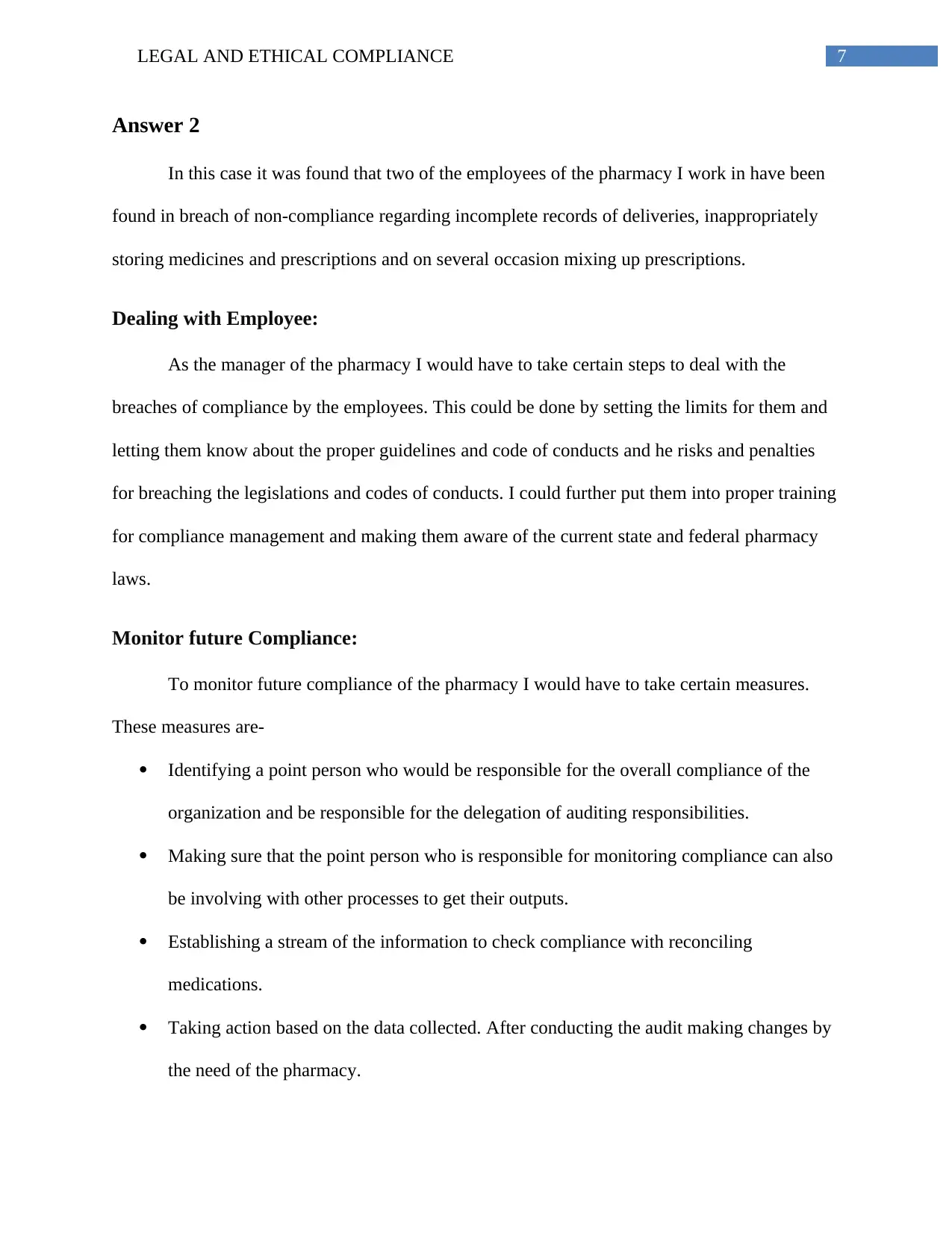
7LEGAL AND ETHICAL COMPLIANCE
Answer 2
In this case it was found that two of the employees of the pharmacy I work in have been
found in breach of non-compliance regarding incomplete records of deliveries, inappropriately
storing medicines and prescriptions and on several occasion mixing up prescriptions.
Dealing with Employee:
As the manager of the pharmacy I would have to take certain steps to deal with the
breaches of compliance by the employees. This could be done by setting the limits for them and
letting them know about the proper guidelines and code of conducts and he risks and penalties
for breaching the legislations and codes of conducts. I could further put them into proper training
for compliance management and making them aware of the current state and federal pharmacy
laws.
Monitor future Compliance:
To monitor future compliance of the pharmacy I would have to take certain measures.
These measures are-
Identifying a point person who would be responsible for the overall compliance of the
organization and be responsible for the delegation of auditing responsibilities.
Making sure that the point person who is responsible for monitoring compliance can also
be involving with other processes to get their outputs.
Establishing a stream of the information to check compliance with reconciling
medications.
Taking action based on the data collected. After conducting the audit making changes by
the need of the pharmacy.
Answer 2
In this case it was found that two of the employees of the pharmacy I work in have been
found in breach of non-compliance regarding incomplete records of deliveries, inappropriately
storing medicines and prescriptions and on several occasion mixing up prescriptions.
Dealing with Employee:
As the manager of the pharmacy I would have to take certain steps to deal with the
breaches of compliance by the employees. This could be done by setting the limits for them and
letting them know about the proper guidelines and code of conducts and he risks and penalties
for breaching the legislations and codes of conducts. I could further put them into proper training
for compliance management and making them aware of the current state and federal pharmacy
laws.
Monitor future Compliance:
To monitor future compliance of the pharmacy I would have to take certain measures.
These measures are-
Identifying a point person who would be responsible for the overall compliance of the
organization and be responsible for the delegation of auditing responsibilities.
Making sure that the point person who is responsible for monitoring compliance can also
be involving with other processes to get their outputs.
Establishing a stream of the information to check compliance with reconciling
medications.
Taking action based on the data collected. After conducting the audit making changes by
the need of the pharmacy.
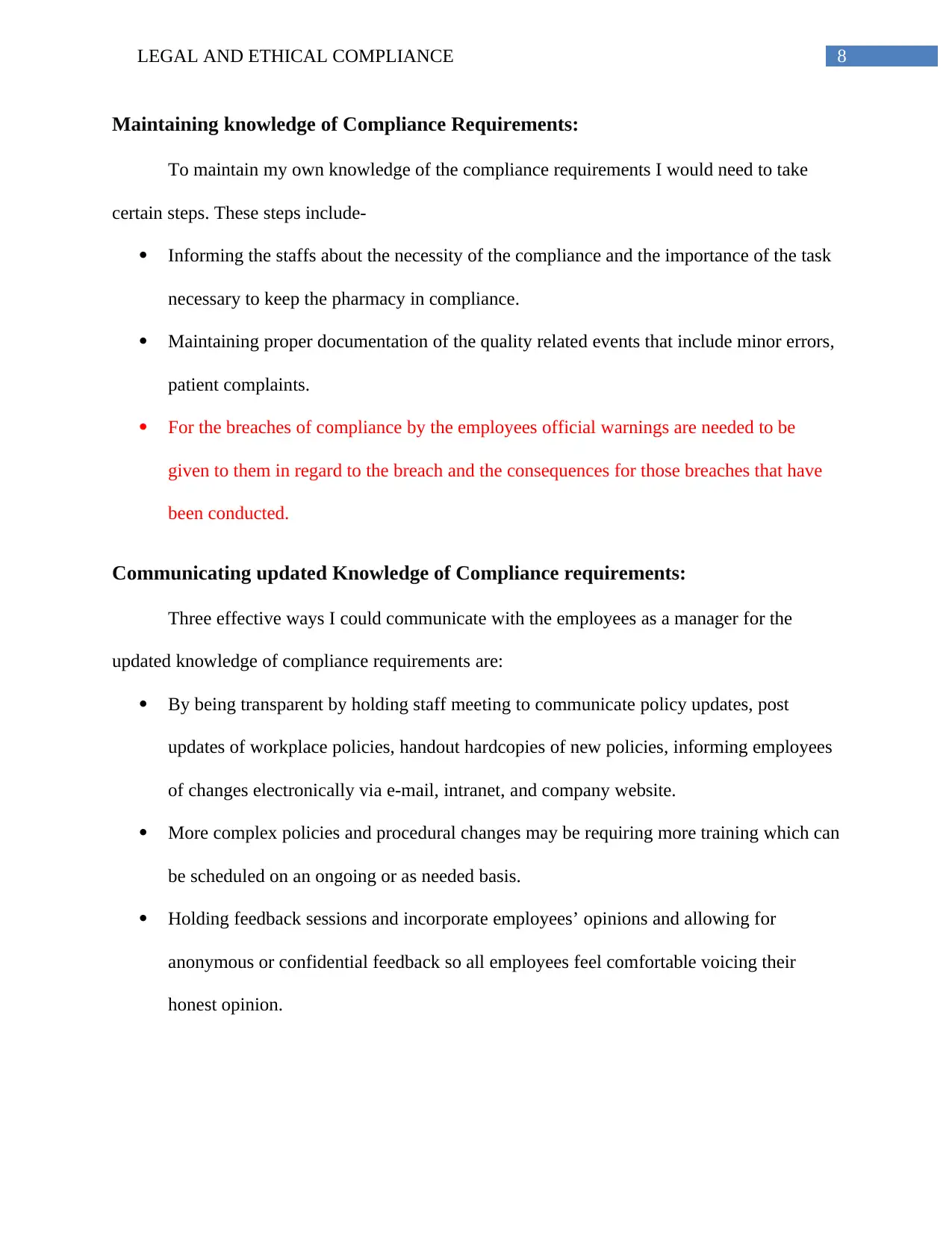
8LEGAL AND ETHICAL COMPLIANCE
Maintaining knowledge of Compliance Requirements:
To maintain my own knowledge of the compliance requirements I would need to take
certain steps. These steps include-
Informing the staffs about the necessity of the compliance and the importance of the task
necessary to keep the pharmacy in compliance.
Maintaining proper documentation of the quality related events that include minor errors,
patient complaints.
For the breaches of compliance by the employees official warnings are needed to be
given to them in regard to the breach and the consequences for those breaches that have
been conducted.
Communicating updated Knowledge of Compliance requirements:
Three effective ways I could communicate with the employees as a manager for the
updated knowledge of compliance requirements are:
By being transparent by holding staff meeting to communicate policy updates, post
updates of workplace policies, handout hardcopies of new policies, informing employees
of changes electronically via e-mail, intranet, and company website.
More complex policies and procedural changes may be requiring more training which can
be scheduled on an ongoing or as needed basis.
Holding feedback sessions and incorporate employees’ opinions and allowing for
anonymous or confidential feedback so all employees feel comfortable voicing their
honest opinion.
Maintaining knowledge of Compliance Requirements:
To maintain my own knowledge of the compliance requirements I would need to take
certain steps. These steps include-
Informing the staffs about the necessity of the compliance and the importance of the task
necessary to keep the pharmacy in compliance.
Maintaining proper documentation of the quality related events that include minor errors,
patient complaints.
For the breaches of compliance by the employees official warnings are needed to be
given to them in regard to the breach and the consequences for those breaches that have
been conducted.
Communicating updated Knowledge of Compliance requirements:
Three effective ways I could communicate with the employees as a manager for the
updated knowledge of compliance requirements are:
By being transparent by holding staff meeting to communicate policy updates, post
updates of workplace policies, handout hardcopies of new policies, informing employees
of changes electronically via e-mail, intranet, and company website.
More complex policies and procedural changes may be requiring more training which can
be scheduled on an ongoing or as needed basis.
Holding feedback sessions and incorporate employees’ opinions and allowing for
anonymous or confidential feedback so all employees feel comfortable voicing their
honest opinion.
⊘ This is a preview!⊘
Do you want full access?
Subscribe today to unlock all pages.

Trusted by 1+ million students worldwide
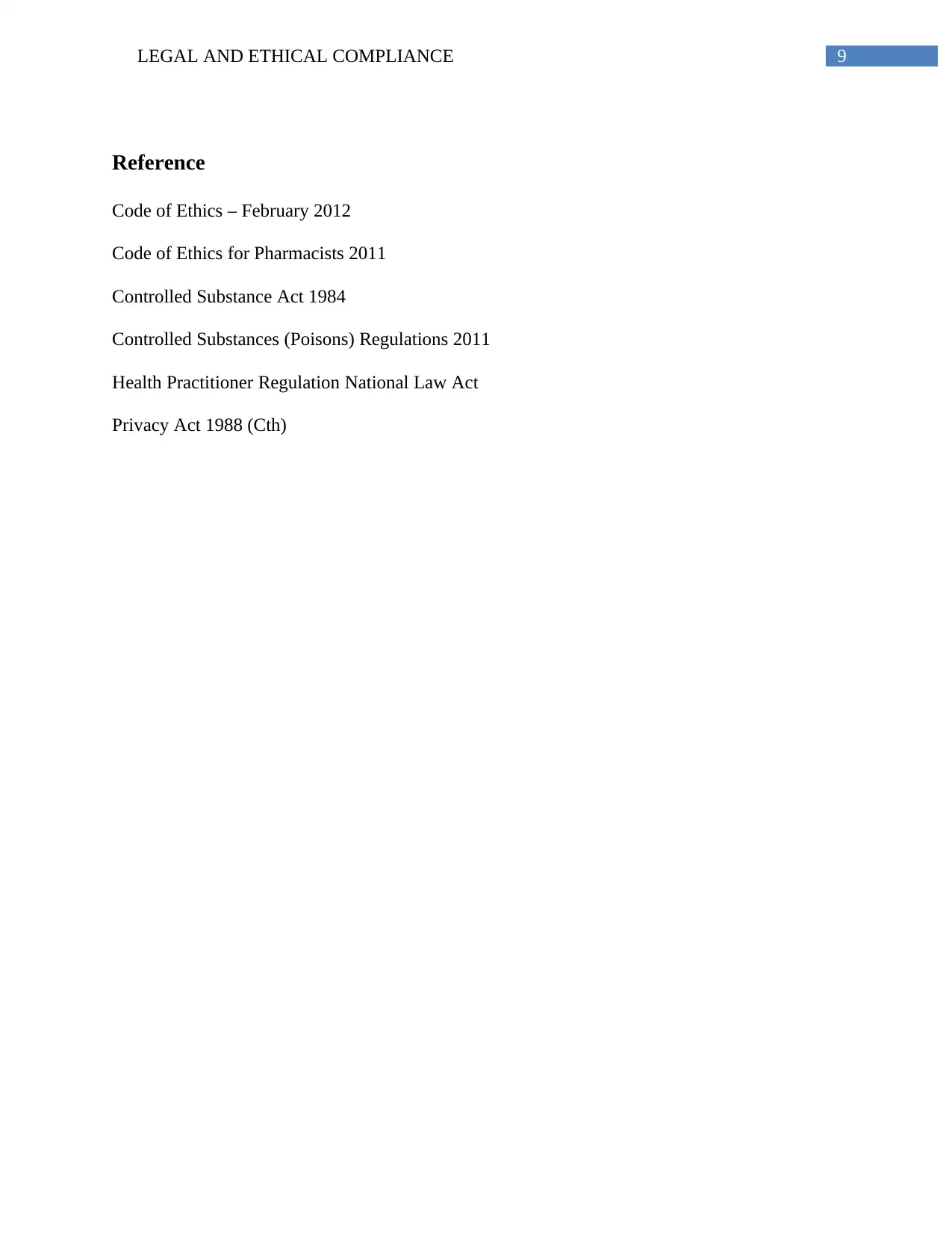
9LEGAL AND ETHICAL COMPLIANCE
Reference
Code of Ethics – February 2012
Code of Ethics for Pharmacists 2011
Controlled Substance Act 1984
Controlled Substances (Poisons) Regulations 2011
Health Practitioner Regulation National Law Act
Privacy Act 1988 (Cth)
Reference
Code of Ethics – February 2012
Code of Ethics for Pharmacists 2011
Controlled Substance Act 1984
Controlled Substances (Poisons) Regulations 2011
Health Practitioner Regulation National Law Act
Privacy Act 1988 (Cth)
1 out of 10
Related Documents
Your All-in-One AI-Powered Toolkit for Academic Success.
+13062052269
info@desklib.com
Available 24*7 on WhatsApp / Email
![[object Object]](/_next/static/media/star-bottom.7253800d.svg)
Unlock your academic potential
Copyright © 2020–2025 A2Z Services. All Rights Reserved. Developed and managed by ZUCOL.





